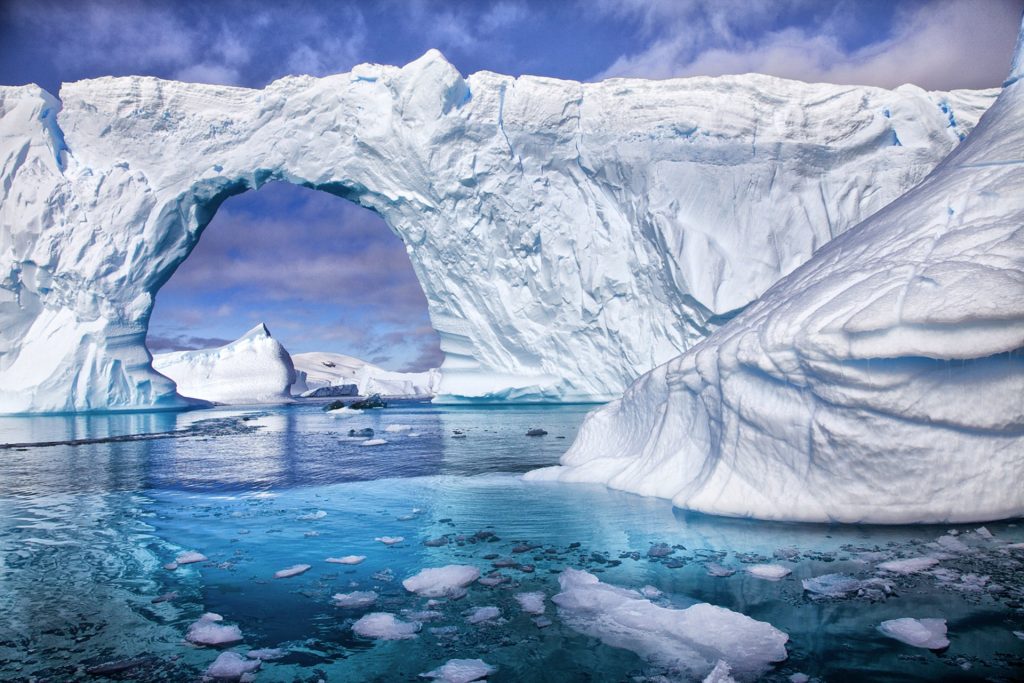At the southernmost point of the Earth, there is a mysterious and magnificent world of ice and snow – Antarctica. This vast continent, with its unique geographical location, extreme climatic conditions, rich ecological resources and endless scientific exploration value, attracts countless explorers and scientists to come to explore.
Basic conditions of Antarctica
Antarctica, the southernmost part of the earth and surrounded by the Southern Ocean, is the southernmost, highest and coldest continent in the world. It has a vast area of about 14.245 million square kilometers, of which the continental area is about 12.393 million square kilometers, the continental ice area is about 1.582 million square kilometers, and the island area is about 76,000 square kilometers. Antarctica is dominated by plateaus, with an average elevation of 2,350 meters, making it the highest continent on Earth.
Antarctica’s climate is extremely harsh, with ice and snow all year round. Due to the high latitudes, receiving very limited solar radiation, and the existence of a thick layer of ice clouds over Antarctica, the temperature here is extremely low, and the extreme minimum temperature has reached -89.2 ° C. In addition, Antarctica is also known for strong winds and blizzards, with wind speeds often reaching tens of meters per second, or even hundreds of meters, forming a unique “Antarctic storm”.
Despite its harsh environment, Antarctica has a rich and unique ecological environment. The variety of life here is small, but it is very representative. Penguins, seals, sea lions and other Marine mammals thrive here, forming a unique ecological community. At the same time, Antarctica is also rich in Marine biological resources, such as Antarctic krill, which provides important support for the global Marine ecosystem.

The role and significance of Antarctica in Earth science research
As the last unexplored pure land on Earth, Antarctica is of great value to earth science research. First, Antarctica’s glaciers and ice sheets contain a wealth of climate information, and by studying these ice core samples, scientists can understand the Earth’s past climate change history and predict future climate change trends. Secondly, the geological structure and mineral resources of Antarctica also provide important clues for earth science research. For example, rock samples from Antarctica hold geological information about the early Earth, which is important for studying the formation and evolution of the Earth. In addition, Antarctica is also an important place to study the Earth’s magnetic field, gravity field and other physical fields, which is of great significance for exploring the physical characteristics of the Earth.
Antarctica also has a special place when it comes to climate observations. Antarctica is one of the main cold sources of the global atmosphere, which has an important influence on the global atmospheric circulation and weather and climate formation. Changes in ice and snow cover in the Antarctic region and in the Marine environment will have profound effects on the global climate. Therefore, through the observation and monitoring of the climate in the Antarctic region, scientists can more accurately understand the trend and law of global climate change, and provide a scientific basis for coping with climate change.
Antarctica also plays an important role in ecological conservation. Antarctica is the world’s last largely unexplored continent, and its ecology is relatively pristine and pure. However, with the continuous increase of human activities, Antarctica’s ecological environment is also facing a growing threat. Therefore, strengthening ecological protection in Antarctica will not only help protect this precious ecological environment, but also help maintain global ecological balance and sustainable development.

Tourism resources and exploration activities in Antarctica
Although the environment of Antarctica is harsh, it has unique tourism resources and exploration value. First of all, Antarctica’s ice landscape is spectacular and beautiful, attracting countless photographers and snow sports enthusiasts to come to see it. Here, visitors can enjoy the endless ice and snow world and feel the magnificence and mystery of nature.
Antarctica is also one of the best places to see sea life such as penguins. On the coast of Antarctica, visitors can observe these lovely sea creatures up close and feel the harmonious coexistence between them and humans. In addition, Antarctica’s Marine biological resources are also extremely rich, tourists can participate in wave fishing and other activities, experience the fun of close contact with Marine life.
In addition to seeing and experiencing, Antarctica is also rich in adventure activities. For example, ice and snow exploration is a very challenging activity that requires a high level of physical fitness and professional skills. Here, visitors can challenge themselves, go beyond their limits, and feel the excitement and sense of achievement brought by adventure. In addition, there are many unknown areas waiting for people to explore and discover, such as unknown biological species, unique natural landscapes and so on.
The unique charm and attraction of Antarctica
Antarctica, with its unique geographical location, extreme climatic conditions, rich ecological resources and endless scientific exploration value, attracts countless explorers and scientists to come to explore. Here, people can feel the magnificence and mystery of nature, challenge themselves, go beyond the limit, and experience the excitement and sense of achievement brought by adventure. At the same time, the ecological conservation work in Antarctica also reminds us that protecting this precious ecological environment is the responsibility and obligation of each of us.
Antarctica is an icy world full of mystery and charm. Here, we can not only enjoy the spectacular snow and ice landscape and unique ecological environment, but also experience the excitement and sense of achievement brought by adventure. Antarctica is also an important site for earth science research, climate observation and ecological conservation. Let us focus on the conservation and development of Antarctica and explore more possibilities and hope for the future of mankind.





















